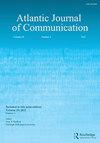Student-instructor communication during a crisis: college students’ disclosures about academic struggles and perceived instructor supportiveness and flexibility during the COVID-19 pandemic
IF 1
Q3 COMMUNICATION
引用次数: 6
Abstract
ABSTRACT This study investigates student disclosures of academic struggles to their instructors during the COVID-19 pandemic. An online survey was administered to U.S. college students (N = 458) who were enrolled in classes during the COVID-19 pandemic. Students’ breadth, depth, and frequency of disclosures of academic struggles were examined in conjunction with students’ perceptions of instructor characteristics, such as instructor supportiveness and flexibility, contextual criteria for disclosure, and risk of disclosure. The study findings indicate that instructor supportiveness and instructor flexibility were significant predictors of the breadth of student disclosures. Students’ depth and frequency of disclosures also were significantly predicted by instructor supportiveness. Further, students’ perceptions of the risk of disclosure were significantly related to both instructor supportiveness and instructor flexibility. Finally, students’ disclosure of academic struggles to their instructors during the COVID-19 pandemic were significantly predicted by the contextual criteria important reason and conversational appropriateness. Analysis of open-ended survey responses indicated that students are willing to disclose their academic struggles to instructors who are open-minded and willing to self-disclose their own struggles. The implications of the present study results on instructor-student communication in times of crisis and post-COVID-19 are discussed.危机期间学生与教师的沟通:大学生在COVID-19大流行期间对学业困难的披露以及感知到的教师的支持和灵活性
本研究调查了COVID-19大流行期间学生向教师披露的学术斗争。对新冠肺炎大流行期间入学的美国大学生(N = 458)进行了一项在线调查。学生披露学术斗争的广度、深度和频率与学生对教师特征的看法(如教师的支持性和灵活性、披露的背景标准和披露的风险)一起进行了研究。研究结果显示,教师支持性和教师灵活性是学生信息披露广度的显著预测因子。教师支持度对学生信息披露的深度和频率也有显著的预测作用。此外,学生对披露风险的认知与教师支持度和教师灵活性均显著相关。最后,语境标准、重要原因和会话适当性显著预测了学生在新冠肺炎大流行期间向教师披露学业困难的情况。对开放式调查结果的分析表明,学生愿意向思想开放、愿意自我披露自己的挣扎的导师透露自己的学业挣扎。讨论了本研究结果对危机时期和后疫情时期师生沟通的影响。
本文章由计算机程序翻译,如有差异,请以英文原文为准。
求助全文
约1分钟内获得全文
求助全文

 求助内容:
求助内容: 应助结果提醒方式:
应助结果提醒方式:


